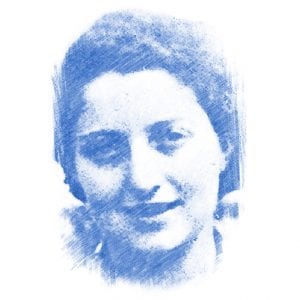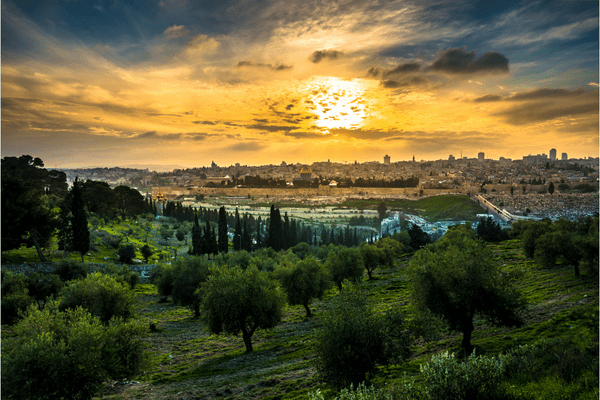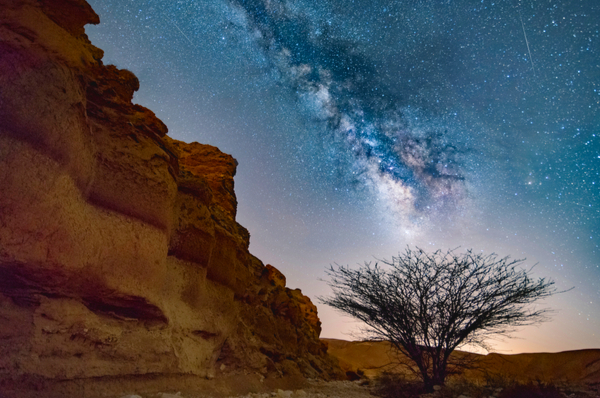
TORAH
NEVI'IM
KETUVIM
Chapter 26
Translation and Transliteration of
Listen to this chapter in Hebrew:
- Commentary
- Buy E-book
- Buy the Israel Bible
1There was a famine in the land—aside from the previous famine that had occurred in the days of Avraham—and Yitzchak went to Abimelech, king of the Philistines, in Gerar.
אוַיְהִי רָעָב בָּאָרֶץ מִלְּבַד הָרָעָב הָרִאשׁוֹן אֲשֶׁר הָיָה בִּימֵי אַבְרָהָם וַיֵּלֶךְ יִצְחָק אֶל־אֲבִימֶּלֶךְ מֶלֶךְ־פְּלִשְׁתִּים גְּרָרָה׃
2Hashem had appeared to him and said, “Do not go down to Egypt; stay in the land which I point out to you.
בוַיֵּרָא אֵלָיו יְהֹוָה וַיֹּאמֶר אַל־תֵּרֵד מִצְרָיְמָה שְׁכֹן בָּאָרֶץ אֲשֶׁר אֹמַר אֵלֶיךָ׃
3Reside in this land, and I will be with you and bless you; I will assign all these lands to you and to your heirs, fulfilling the oath that I swore to your father Avraham.
GUR ba-A-retz ha-ZOT v'-eh-YEH i-m'-KHA va-a-va-r'-KHE-ka kee l'-KHA ul-zar-a-KHA e-TAYN et kol ha-a-ra-TZOT ha-AYL va-ha-ki-mo-TEE et ha-sh'-vu-AH a-SHER nish-BA-tee l'-av-ra-HAM a-VEE-kha
גגּוּר בָּאָרֶץ הַזֹּאת וְאֶהְיֶה עִמְּךָ וַאֲבָרְכֶךָּ כִּי־לְךָ וּלְזַרְעֲךָ אֶתֵּן אֶת־כָּל־הָאֲרָצֹת הָאֵל וַהֲקִמֹתִי אֶת־הַשְּׁבֻעָה אֲשֶׁר נִשְׁבַּעְתִּי לְאַבְרָהָם אָבִיךָ׃
26:3 Reside in this land, and I will be with you and bless you
Yitzchak is warned that despite the famine in Eretz Yisrael, he is not to escape the hardship by fleeing to Egypt. Though Avraham went down to Egypt when there was a plague in Israel, and Yaakov likewise descended to Egypt towards the end of his life, God told Yitzchak not to leave the Land of Israel. Due to the unique spiritual status he acquired after being offered on the altar, Yitzchak was the only one of the three forefathers to never step foot outside of the Holy Land.
4I will make your heirs as numerous as the stars of heaven, and assign to your heirs all these lands, so that all the nations of the earth shall bless themselves by your heirs
v'-hir-bay-TEE et zar-a-KHA k'-kho-kh'-VAY ha-sha-MA-yim v'-na-ta-TEE l'-zar-a-KHA AYT kol ha-a-ra-TZOT ha-AYL v'-hit-ba-r'-KHU v'-zar-a-KHA KOL go-YAY ha-A-retz
דוְהִרְבֵּיתִי אֶת־זַרְעֲךָ כְּכוֹכְבֵי הַשָּׁמַיִם וְנָתַתִּי לְזַרְעֲךָ אֵת כָּל־הָאֲרָצֹת הָאֵל וְהִתְבָּרֲכוּ בְזַרְעֲךָ כֹּל גּוֹיֵי הָאָרֶץ׃
![]() 26:4 I will make your heirs as numerous as the stars of heaven
26:4 I will make your heirs as numerous as the stars of heaven

Chana Senesh (1921-1944)
Why are the children of Avraham compared to the stars? The poetess Chana Senesh was born in Hungary in 1921 and in 1939 she emigrated to what was then the British Mandate of Palestine. Senesh was a brave heroine who volunteered to leave her beloved Palestine in 1944 in order to fight with the partisans against the Nazis. Unfortunately, she was caught, tried for treason and eventually executed. In one of her beautiful poems she wrote, “There are stars whose radiance is visible on earth though they have long been extinct. There are people whose brilliance continues to light the world though they are no longer among the living. These lights are particularly bright when the night is dark. They light the way for mankind.” Like the stars in Senesh’s poem, the Jew’s role in this world is to light the way for mankind, despite the darkness we have encountered throughout our history.
5inasmuch as Avraham obeyed Me and kept My charge: My commandments, My laws, and My teachings.”
העֵקֶב אֲשֶׁר־שָׁמַע אַבְרָהָם בְּקֹלִי וַיִּשְׁמֹר מִשְׁמַרְתִּי מִצְוׂתַי חֻקּוֹתַי וְתוֹרֹתָי׃
6So Yitzchak stayed in Gerar.
ווַיֵּשֶׁב יִצְחָק בִּגְרָר׃
7When the men of the place asked him about his wife, he said, “She is my sister,” for he was afraid to say “my wife,” thinking, “The men of the place might kill me on account of Rivka, for she is beautiful.”
זוַיִּשְׁאֲלוּ אַנְשֵׁי הַמָּקוֹם לְאִשְׁתּוֹ וַיֹּאמֶר אֲחֹתִי הִוא כִּי יָרֵא לֵאמֹר אִשְׁתִּי פֶּן־יַהַרְגֻנִי אַנְשֵׁי הַמָּקוֹם עַל־רִבְקָה כִּי־טוֹבַת מַרְאֶה הִיא׃
8When some time had passed, Abimelech king of the Philistines, looking out of the window, saw Yitzchak fondling his wife Rivka.
חוַיְהִי כִּי אָרְכוּ־לוֹ שָׁם הַיָּמִים וַיַּשְׁקֵף אֲבִימֶלֶךְ מֶלֶךְ פְּלִשְׁתִּים בְּעַד הַחַלּוֹן וַיַּרְא וְהִנֵּה יִצְחָק מְצַחֵק אֵת רִבְקָה אִשְׁתּוֹ׃
9Abimelech sent for Yitzchak and said, “So she is your wife! Why then did you say: ‘She is my sister?'” Yitzchak said to him, “Because I thought I might lose my life on account of her.”
טוַיִּקְרָא אֲבִימֶלֶךְ לְיִצְחָק וַיֹּאמֶר אַךְ הִנֵּה אִשְׁתְּךָ הִוא וְאֵיךְ אָמַרְתָּ אֲחֹתִי הִוא וַיֹּאמֶר אֵלָיו יִצְחָק כִּי אָמַרְתִּי פֶּן־אָמוּת עָלֶיהָ׃
10Abimelech said, “What have you done to us! One of the people might have lain with your wife, and you would have brought guilt upon us.”
יוַיֹּאמֶר אֲבִימֶלֶךְ מַה־זֹּאת עָשִׂיתָ לָּנוּ כִּמְעַט שָׁכַב אַחַד הָעָם אֶת־אִשְׁתֶּךָ וְהֵבֵאתָ עָלֵינוּ אָשָׁם׃
11Abimelech then charged all the people, saying, “Anyone who molests this man or his wife shall be put to death.”
יאוַיְצַו אֲבִימֶלֶךְ אֶת־כָּל־הָעָם לֵאמֹר הַנֹּגֵעַ בָּאִישׁ הַזֶּה וּבְאִשְׁתּוֹ מוֹת יוּמָת׃
12Yitzchak sowed in that land and reaped a hundredfold the same year. Hashem blessed him,
יבוַיִּזְרַע יִצְחָק בָּאָרֶץ הַהִוא וַיִּמְצָא בַּשָּׁנָה הַהִוא מֵאָה שְׁעָרִים וַיְבָרֲכֵהוּ יְהֹוָה׃
13and the man grew richer and richer until he was very wealthy:
יגוַיִּגְדַּל הָאִישׁ וַיֵּלֶךְ הָלוֹךְ וְגָדֵל עַד כִּי־גָדַל מְאֹד׃
14he acquired flocks and herds, and a large household, so that the Philistines envied him.
ידוַיְהִי־לוֹ מִקְנֵה־צֹאן וּמִקְנֵה בָקָר וַעֲבֻדָּה רַבָּה וַיְקַנְאוּ אֹתוֹ פְּלִשְׁתִּים׃
15And the Philistines stopped up all the wells which his father's servants had dug in the days of his father Avraham, filling them with earth.
טווְכָל־הַבְּאֵרֹת אֲשֶׁר חָפְרוּ עַבְדֵי אָבִיו בִּימֵי אַבְרָהָם אָבִיו סִתְּמוּם פְּלִשְׁתִּים וַיְמַלְאוּם עָפָר׃
16And Abimelech said to Yitzchak, “Go away from us, for you have become far too big for us.”
va-YO-mer ah-vi-MEH-lekh el yitz-KHAK lekh me-ee-MAH-noo kee ah-TZAM-tah mee-MEH-noo m'-OHD
טזוַיֹּאמֶר אֲבִימֶלֶךְ אֶל־יִצְחָק לֵךְ מֵעִמָּנוּ כִּי־עָצַמְתָּ־מִמֶּנּוּ מְאֹד׃
![]() 26:16 Go away from us, for you have become far too big for us
26:16 Go away from us, for you have become far too big for us
The story of Yitzchak among the Philistines alludes to the history of the Jewish people during their lengthy exile, hosted by various foreign nations. Rabbi Zalman Sorotzkin points out that Yitzchak is one Jew in an entire country, yet the Philistines claim that there is no room for him. As a successful farmer, Yitzchak is not an economic burden on his hosts, and yet the Philistines banish him. They could have learned agricultural techniques and benefitted from his water, but they instead choose to ignore the valuable contributions he could make, and they clog the wells he has dug. Similarly, many Jewish inventors and innovators have been expelled from their host nations throughout history. The only safe place where the Children of Israel can flourish is in the Land of Israel.
17So Yitzchak departed from there and encamped in the wadi of Gerar, where he settled.
יזוַיֵּלֶךְ מִשָּׁם יִצְחָק וַיִּחַן בְּנַחַל־גְּרָר וַיֵּשֶׁב שָׁם׃
18Yitzchak dug anew the wells which had been dug in the days of his father Avraham and which the Philistines had stopped up after Avraham's death; and he gave them the same names that his father had given them.
יחוַיָּשָׁב יִצְחָק וַיַּחְפֹּר אֶת־בְּאֵרֹת הַמַּיִם אֲשֶׁר חָפְרוּ בִּימֵי אַבְרָהָם אָבִיו וַיְסַתְּמוּם פְּלִשְׁתִּים אַחֲרֵי מוֹת אַבְרָהָם וַיִּקְרָא לָהֶן שֵׁמוֹת כַּשֵּׁמֹת אֲשֶׁר־קָרָא לָהֶן אָבִיו׃
19But when Yitzchak's servants, digging in the wadi, found there a well of spring water,
יטוַיַּחְפְּרוּ עַבְדֵי־יִצְחָק בַּנָּחַל וַיִּמְצְאוּ־שָׁם בְּאֵר מַיִם חַיִּים׃
20the herdsmen of Gerar quarreled with Yitzchak's herdsmen, saying, “The water is ours.” He named that well Esek, because they contended with him.
כוַיָּרִיבוּ רֹעֵי גְרָר עִם־רֹעֵי יִצְחָק לֵאמֹר לָנוּ הַמָּיִם וַיִּקְרָא שֵׁם־הַבְּאֵר עֵשֶׂק כִּי הִתְעַשְּׂקוּ עִמּוֹ׃
21And when they dug another well, they disputed over that one also; so he named it Sitnah.
כאוַיַּחְפְּרוּ בְּאֵר אַחֶרֶת וַיָּרִיבוּ גַּם־עָלֶיהָ וַיִּקְרָא שְׁמָהּ שִׂטְנָה׃
22He moved from there and dug yet another well, and they did not quarrel over it; so he called it Rehoboth, saying, “Now at last Hashem has granted us ample space to increase in the land.”
va-ya-TAYK mi-SHAM va-yakh-POR b'-AYR a-KHE-ret v'-LO ra-VU a-LEY-ha va-yik-RA sh'-MAH r'-kho-VOT va-YO-mer kee a-TAH hir-KHEEV a-do-NAI LA-nu u-fa-REE-nu va-A-retz
כבוַיַּעְתֵּק מִשָּׁם וַיַּחְפֹּר בְּאֵר אַחֶרֶת וְלֹא רָבוּ עָלֶיהָ וַיִּקְרָא שְׁמָהּ רְחֹבוֹת וַיֹּאמֶר כִּי־עַתָּה הִרְחִיב יְהֹוָה לָנוּ וּפָרִינוּ בָאָרֶץ׃
23From there he went up to Be'er Sheva.
כגוַיַּעַל מִשָּׁם בְּאֵר שָׁבַע׃
24That night Hashem appeared to him and said, “I am the God of your father Avraham. Fear not, for I am with you, and I will bless you and increase your offspring for the sake of My servant Avraham.”
כדוַיֵּרָא אֵלָיו יְהֹוָה בַּלַּיְלָה הַהוּא וַיֹּאמֶר אָנֹכִי אֱלֹהֵי אַבְרָהָם אָבִיךָ אַל־תִּירָא כִּי־אִתְּךָ אָנֹכִי וּבֵרַכְתִּיךָ וְהִרְבֵּיתִי אֶת־זַרְעֲךָ בַּעֲבוּר אַבְרָהָם עַבְדִּי׃
25So he built a mizbayach there and invoked Hashem by name. Yitzchak pitched his tent there and his servants started digging a well.
כהוַיִּבֶן שָׁם מִזְבֵּחַ וַיִּקְרָא בְּשֵׁם יְהֹוָה וַיֶּט־שָׁם אָהֳלוֹ וַיִּכְרוּ־שָׁם עַבְדֵי־יִצְחָק בְּאֵר׃
26And Abimelech came to him from Gerar, with Ahuzzath his councilor and Phicol chief of his troops.
כווַאֲבִימֶלֶךְ הָלַךְ אֵלָיו מִגְּרָר וַאֲחֻזַּת מֵרֵעֵהוּ וּפִיכֹל שַׂר־צְבָאוֹ׃
27Yitzchak said to them, “Why have you come to me, seeing that you have been hostile to me and have driven me away from you?”
כזוַיֹּאמֶר אֲלֵהֶם יִצְחָק מַדּוּעַ בָּאתֶם אֵלָי וְאַתֶּם שְׂנֵאתֶם אֹתִי וַתְּשַׁלְּחוּנִי מֵאִתְּכֶם׃
28And they said, “We now see plainly that Hashem has been with you, and we thought: Let there be a sworn treaty between our two parties, between you and us. Let us make a pact with you
כחוַיֹּאמְרוּ רָאוֹ רָאִינוּ כִּי־הָיָה יְהֹוָה עִמָּךְ וַנֹּאמֶר תְּהִי נָא אָלָה בֵּינוֹתֵינוּ בֵּינֵינוּ וּבֵינֶךָ וְנִכְרְתָה בְרִית עִמָּךְ׃
29that you will not do us harm, just as we have not molested you but have always dealt kindly with you and sent you away in peace. From now on, be you blessed of Hashem!”
כטאִם־תַּעֲשֵׂה עִמָּנוּ רָעָה כַּאֲשֶׁר לֹא נְגַעֲנוּךָ וְכַאֲשֶׁר עָשִׂינוּ עִמְּךָ רַק־טוֹב וַנְּשַׁלֵּחֲךָ בְּשָׁלוֹם אַתָּה עַתָּה בְּרוּךְ יְהֹוָה׃
30Then he made for them a feast, and they ate and drank.
לוַיַּעַשׂ לָהֶם מִשְׁתֶּה וַיֹּאכְלוּ וַיִּשְׁתּוּ׃
31Early in the morning, they exchanged oaths. Yitzchak then bade them farewell, and they departed from him in peace.
לאוַיַּשְׁכִּימוּ בַבֹּקֶר וַיִּשָּׁבְעוּ אִישׁ לְאָחִיו וַיְשַׁלְּחֵם יִצְחָק וַיֵּלְכוּ מֵאִתּוֹ בְּשָׁלוֹם׃
32That same day Yitzchak's servants came and told him about the well they had dug, and said to him, “We have found water!”
לבוַיְהִי בַּיּוֹם הַהוּא וַיָּבֹאוּ עַבְדֵי יִצְחָק וַיַּגִּדוּ לוֹ עַל־אֹדוֹת הַבְּאֵר אֲשֶׁר חָפָרוּ וַיֹּאמְרוּ לוֹ מָצָאנוּ מָיִם׃
33He named it Shibah; therefore the name of the city is Be'er Sheva to this day.
לגוַיִּקְרָא אֹתָהּ שִׁבְעָה עַל־כֵּן שֵׁם־הָעִיר בְּאֵר שֶׁבַע עַד הַיּוֹם הַזֶּה׃
34When Esau was forty years old, he took to wife Judith daughter of Be'eri the Hittite, and Basemath daughter of Elon the Hittite;
לדוַיְהִי עֵשָׂו בֶּן־אַרְבָּעִים שָׁנָה וַיִּקַּח אִשָּׁה אֶת־יְהוּדִית בַּת־בְּאֵרִי הַחִתִּי וְאֶת־בָּשְׂמַת בַּת־אֵילֹן הַחִתִּי׃
35and they were a source of bitterness to Yitzchak and Rivka.
להוַתִּהְיֶיןָ מֹרַת רוּחַ לְיִצְחָק וּלְרִבְקָה׃








